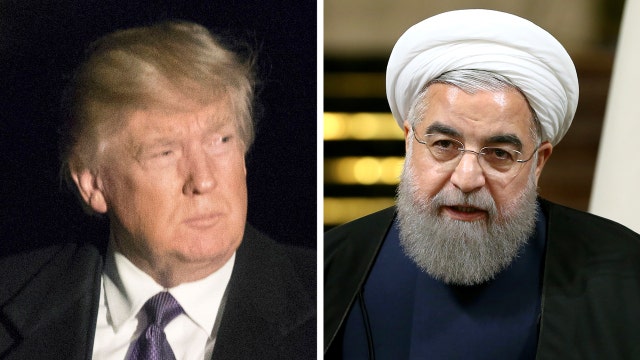Iran ramps up rhetoric against Trump
Chris Snyder reports on White House sending new message to Iran over their controversial nuclear program
As a new U.S. administration highly critical of the nuclear deal it calls "the worst ever negotiated" settles into Washington, a top expert says the agreement between Iran and several other world powers could fall apart -- although the Islamic Republic would not pull the plug.
SHADOWY IRANIAN GENERAL VISITS MOSCOW, VIOLATING SANCTIONS
Mark Fitzpatrick of the International Institute for Strategic Studies has been intimately involved with the ins and outs of the landmark nuclear deal with Iran, signed by the U.S., Europe, Russia and China back in 2015. Fitzpatrick has tracked every centrifuge and studied each satellite image of nuclear sites that have been spotted from the skies for more than a decade. He has been privy to meetings of experts on both sides, has traveled the region extensively, and studies the possible scenarios that could arise should the deal, that curtails and monitors Iran's nuclear activity, fail.
Fitzpatrick shares some of his thoughts about the way forward with the Islamic Republic, and containing its suspect nuclear program.
OPINION: THE SURPRISING TRUTH ABOUT IRAN AND THE WEST
"I think it's clear that the nuclear deal is in jeopardy," he tells Fox News, but notes that Iran does not want to be the one to break that deal. "So there will probably be a tit for tat, and Iran will face additional pressure, not getting the economic benefits it wanted. It will be testing more missiles and so forth and within a year the deal will be under very severe pressure."
Fitzpatrick suggests that if the deal were to unravel, and Iran were to resume the level enrichment that would get it within a couple months of being able to produce highly enriched uranium for a nuclear weapon, there would be serious talk again about the prospect of a military strike.
While conventional wisdom has been that since several states are party to the deal, the United States alone couldn't undo it, Fitzpatrick believes Washington could in fact cause a de facto dismantling of the accord, by effectively keeping European countries to refrain from doing business with the Islamic Republic.
Fitzpatrick believes it is essential to keep up the pressure on Iran, calling it out when it undertakes actions that are detrimental to the security of the United States and its allies in the region. That includes moves like the designated sanctions President Trump imposed after the January 29 ballistic missile test carried out by Tehran, but Fitzpatrick offered his own advice to Trump.
"I would caution him about speaking rhetoric and laying out red lines like 'You are on notice', which is vague. Setting a red line that is vague like that sort of invites the other party to test it, to walk across it, and then the Administration is faced with a moral hazard question."
In other words, Fitzpatrick explained, that hazard is somehow enforcing the fuzzy red line. "That would give," he says, "the other party the belief that it can push the U.S. around."
Fitzpatrick is particularly adamant that calls on Iran to stop harrassing U.S and other ships in the Gulf are kept up. He admits that Iran has increased its missile testing, which it had severely curtailed during nuclear negotiations.
"They are doing more missile tests. Not every missile test, however, is dangerous," Fitzpatrick says. "Iran recently was said to have tested another missile. It wasn't a ballistic missile that could carry nuclear weapons, it was an anti-ship missile. We shouldn't jump at everything Iran does and say 'this is dangerous to the U.S.' We should be careful how we assess Iran. That is my reccomendation."
Fitzpatrick is concerned about the U.S. visa ban, currently suspended, on seven countries, which includes Iran. He says until now, those with pro-U.S. sentiments in Iran could say that U.S. punitive actions vis-a-vis the Islamic Republic were directed at Iranian government officials and actions, "but a visa ban that keeps the entire nation of Iran from entering the U.S. attacks everybody."
Despite decades of severed relations between the two countries, Iran is often said to have one of the most pro-U.S. streets in the Middle East. Fitzpatrick says, "the other point about the visa ban is that there have been no acts of terror in the United States commited by any Iranian citizen, so they are wondering in Iran why they are being blamed."
Fitzpatrick says his Iran contacts tell him that there is debate in the inner circles there about how to respond to President Trump, his words, and his actions. Some say Iranian power players are even debating a new route-"the high road." He says they are genuinely worried that the nuclear deal will fall apart.
Clearly, the hardline factions will have zero interest in talk of high roads. And their own internal debates will likely sharpen, as Iran soon enters its own election cycle, this spring, which is expected to pit sitting President Hassan Rohani, an advocate of better relations between Iran and other countries, against a hardline opponent from the camp that seeks legitimacy in defending an Iran perpetually in confrontation with the West.

